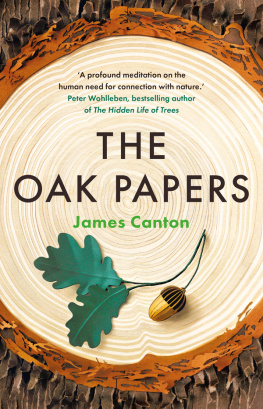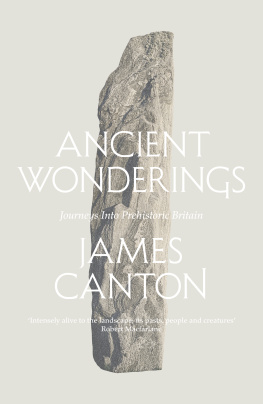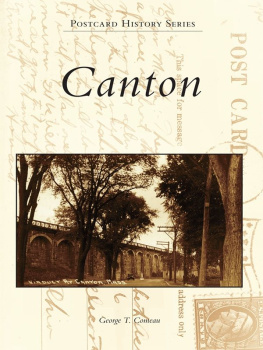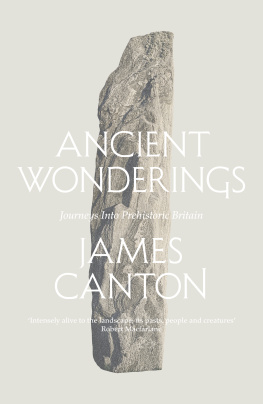James Canton - The Oak Papers
Here you can read online James Canton - The Oak Papers full text of the book (entire story) in english for free. Download pdf and epub, get meaning, cover and reviews about this ebook. publisher: Schwartz Books Pty. Ltd., genre: Detective and thriller. Description of the work, (preface) as well as reviews are available. Best literature library LitArk.com created for fans of good reading and offers a wide selection of genres:
Romance novel
Science fiction
Adventure
Detective
Science
History
Home and family
Prose
Art
Politics
Computer
Non-fiction
Religion
Business
Children
Humor
Choose a favorite category and find really read worthwhile books. Enjoy immersion in the world of imagination, feel the emotions of the characters or learn something new for yourself, make an fascinating discovery.
- Book:The Oak Papers
- Author:
- Publisher:Schwartz Books Pty. Ltd.
- Genre:
- Rating:4 / 5
- Favourites:Add to favourites
- Your mark:
- 80
- 1
- 2
- 3
- 4
- 5
The Oak Papers: summary, description and annotation
We offer to read an annotation, description, summary or preface (depends on what the author of the book "The Oak Papers" wrote himself). If you haven't found the necessary information about the book — write in the comments, we will try to find it.
The Oak Papers — read online for free the complete book (whole text) full work
Below is the text of the book, divided by pages. System saving the place of the last page read, allows you to conveniently read the book "The Oak Papers" online for free, without having to search again every time where you left off. Put a bookmark, and you can go to the page where you finished reading at any time.
Font size:
Interval:
Bookmark:
Praise for The Oak Papers
As one man seeks solace beneath the bows of an ancient oak tree, the tree and its surrounds come to life in shimmering detail. Cantons writing has an exquisite, somewhat dreamlike quality. Peter Wohlleben
A lyrical journey into our deep relationship with trees. Canton shows us how paying attention to our gnarled green elders can reveal rich layers of culture, psychology and ecology. David George Haskell
James Canton knows so much, writes so well and understands so deeply about the true forest magic and the important place these trees have in it. Knowledge and joy. Sara Maitland
This is a moving, poetic and life-affirming exploration of the idea that a person can form a rich and rewarding bond with an individual tree. The Oak Papers possesses great sensitivity, real wisdom and a deep mystical power. Patrick Barkham
With rare delicacy and precision, James Canton has captured the magnificence and mystique of the oak tree. The Oak Papers is a book of deep knowledge, perception and love. Philip Marsden
Intensely alive to the landscape; its pasts, people and creatures. Robert Macfarlane
Also by James Canton
Ancient Wonderings: Journeys into Prehistoric Britain
Out of Essex: Re-Imagining a Literary Landscape
From Cairo to Baghdad: British Travellers in Arabia

Published by Black Inc.,
an imprint of Schwartz Books Pty Ltd
Level 1, 221 Drummond Street
Carlton VIC 3053, Australia
www.blackincbooks.com
This edition is published by arrangement with Canongate Books Ltd, 14 High Street, Edinburgh EHI ITE
Copyright James Canton 2020
James Canton asserts his right to be known as the author of this work.
ALL RIGHTS RESERVED.
No part of this publication may be reproduced, stored in a retrieval system, or transmitted in any form by any means electronic, mechanical, photocopying, recording or otherwise without the prior consent of the publishers.
9781760642594 (paperback)
9781743821442 (ebook)

Cover design by Gill Heeley
Artwork by Diana Beltran Herrera
Text design and typesetting by Palimpsest Book Production Ltd, Falkirk, Stirlingshire
Excerpt from Woods in Collected Poems by Louis MacNeice (Faber & Faber, 1979). Reproduced by permission of David Higham Associates.
Excerpts from Burnt Norton in Four Quartets copyright T.S. Eliot, 1943.
Reproduced by permission of Faber & Faber.
Every effort has been made to trace copyright holders and obtain their permission for the use of copyright material. The publisher apologises for any errors or omissions and would be grateful if notified of any corrections that should be incorporated in future reprints or editions of this book.
To Eva, Molly and Joe
BEGINNINGS
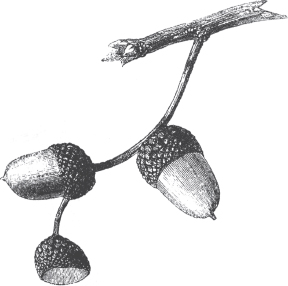
S ome five years ago, I sought solace from the ways of the world by stepping into the embrace of an ancient oak tree. It is a venerable oak tree, eight hundred years old, living on the edge of a wood on a small country estate a few miles from my house. From the first meeting, there grew a strange sense of attachment I did not consciously recognise until I later began to realise the significance that trees, and oak trees especially, can have in our lives. To begin with, I went there for the gentle comfort sitting beside that grand oak offered. I could walk away from my work as a teacher, from my life and responsibilities, and place myself in a world that was something close to Eden. I could go beyond my world into that of the oak. I felt calm descend. Once there I wanted only to watch the comings and goings of the birds, the bees and the rest of the creatures that formed the ecosystem that existed around and about and within that ancient oak tree. I felt a peace envelop me every time I stepped onto the country estate where the oak tree lived. Over the months that followed, I began to visit the oak rather as one might visit a friend. I became better acquainted with it. I got to know the distinctive aspects of the tree and the creatures which lived within its realm. I sat beside the oak tree in all weathers and all seasons, at all times of day and night, until I knew that oak like a member of my family.
With the passing of the years, I can now look back and see what happened to me. There was another reason why I sought the embrace of the canopy of the oak. At the time my relationship with my long-time partner had fractured and begun to break down. She and I had started to live separate lives. From somewhere the notion of spending time beside the Honywood Oak came over me. I cannot say now if it was derived from a desire to avoid home or from a need to find some solitude. In truth, it was no doubt partly both.

Wherever oak trees grow around the globe, people have developed a connection to them. Throughout human history particular oaks have been favoured for their setting, for their age and size. Ancient oaks have always been special. People collect beneath their boughs. They may gather there as a place of significance within the landscape or merely as somewhere to shelter. Whereas we humans are creatures of movement, oaks are static beings. They do not shift. They are born and they die on the same patch of earth. It is that surefootedness that is so appealing. Ancient oaks hold a powerful sense of longevity. The sense of security, the sense of attachment to a place across time, enchants us. We are drawn to old oaks. You can stand beneath a grand oak and know that your more distant ancestors did so too. Oaks hold onto the memories of earlier generations. By touching the skin of the oak it is possible to feel some tentative trace of those that have gone before.
Human beings and oaks have lived beside one another as neighbours since the earliest times and we continue to do so. We no longer need the bodies of oak trees to build our homes, or to fuel our fires, and we no longer need acorns to sustain us through hard years and meagre harvests. Yet on some level we still lean on oak trees. In ways we do not fully understand, we need them.
PART I
SEEING THE OAK
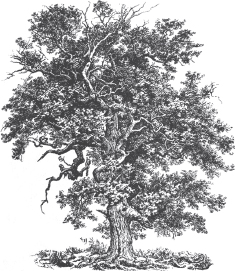
T he Honywood Oak lives on the Marks Hall Estate in north Essex. The tree stands in its own circular enclosure: a low wooden railing that separates the ancient oak from the pine trees surrounding it. The oak has lived here for over eight centuries. Its trunk is knurled and ribbed and close to thirty feet around. The spread of its green-leaf canopy stretches a hundred feet into the spring sky. The tree was a mere sapling when the Magna Carta was signed, when King John reigned over England. As a four-hundred-year-old, its canopy sheltered soldiers during the English Civil War. The owner of the Marks Hall Estate was then Sir Thomas Honywood, a Parliamentarian leader who served in the siege of the local town of Colchester in 1648 and after whom, in more recent years, this grand old oak has been named.

Once there were many oaks, hundreds of ancient trees huddled across these lands. Now there is one. It is a single, lone figure, born on this very foot of soil eight hundred years ago and rose from an acorn to a great tree in the blink of times eye. I came one day to see this oak, born so long ago, so far beyond the memory of any living human being. I sat in its presence and knew that here was peace.
Next pageFont size:
Interval:
Bookmark:
Similar books «The Oak Papers»
Look at similar books to The Oak Papers. We have selected literature similar in name and meaning in the hope of providing readers with more options to find new, interesting, not yet read works.
Discussion, reviews of the book The Oak Papers and just readers' own opinions. Leave your comments, write what you think about the work, its meaning or the main characters. Specify what exactly you liked and what you didn't like, and why you think so.

